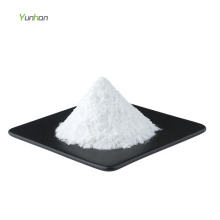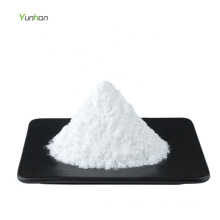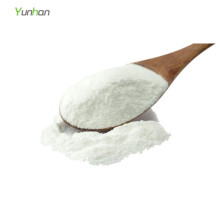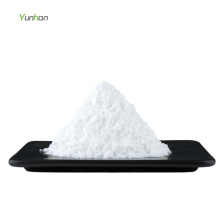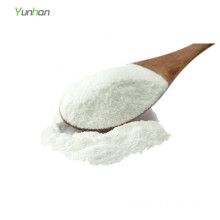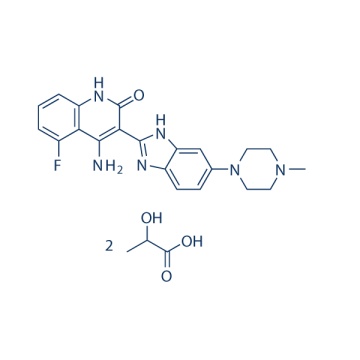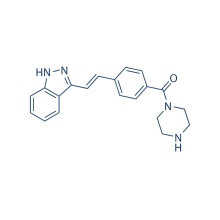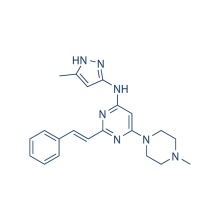Alectinib (CH5424802) 1256580-46-7
Product Description
.cp_wz table {border-top: 1px solid #ccc;border-left:1px solid #ccc; } .cp_wz table td{border-right: 1px solid #ccc; border-bottom: 1px solid #ccc; padding: 5px 0px 0px 5px;} .cp_wz table th {border-right: 1px solid #ccc;border-bottom: 1px solid #ccc; padding: 5px 0px 0px 5px;}
Molecular Weight:
482.62 Alectinib (CH5424802) is a potent ALK Inhibitor with IC50 of 1.9 nM, sensitive to L1196M mutation and higher selectivity for ALK than PF-02341066, NVP-TAE684 and PHA-E429.
Biological Activity
The dissociation constant (KD) value of CH5424802 for ALK in an
ATP-competitive manner is 2.4 nM. CH5424802 has substantial inhibitory
potency against both native ALK and L1196M with Ki of 0.83 nM
and 1.56 nM, respectively. CH5424802 prevents autophosphorylation of
ALK in NCI-H2228 NSCLC cells expressing EML4-ALK. CH5424802 also
suppresses the phosphorylation of STAT3 and AKT, but not of ERK1/2.
CH5424802 completely inhibits the phosphorylation of STAT3 at Tyr705.
CH5424802 is preferentially efficacious against NCI-H2228 cells
expressing EML4-ALK, but not ALK fusion-negative NSCLC cell lines,
including HCC827 cells (EGFR exon 19 deletion), A549 cells (KRAS
mutant), or NCI-H522 cells (EGFR wild-type, KRAS wild-type, and ALK
wild-type) in monolayer culture. CH5424802 elicits an apoptotic
marker-caspase-3/7-like activation-in NCI-H2228 spheroid cells.
CH5424802 blocks the growth of two lymphoma lines, KARPAS-299 and SR,
with NPM-ALK fusion protein but does not influence the growth of an
HDLM-2 lymphoma line without ALK fusion.
CH5424802
displays high target selectivity and the stronger anti-proliferative
activity against KARPAS-299. CH5424802 inhibits KAPRAS-299 with an IC50
of 3 nM, and KDR with IC50 of 1.4 μM. The metabolic stability of
CH5424802 is very high.
Oral administration of CH5424802 dose-dependently inhibits tumor growth
with an ED50 of 0.46 mg/kg and tumor regression. Treatment of 20 mg/kg
CH5424802 reveals rapid tumor regression by 168%, the tumor volume in
any mouse is 3 after 11 days of treatment (at day 28), a potent
antitumor effect is maintained, and tumor regrowth does not occur
throughout the 4-week drug-free period.
The half-life and the oral
bioavailability of CH5424802 in mice are 8.6 hours and 70.8%,
respectively. At a repeated dose of 6 mg/kg, the mean plasma levels
reached 1.7, 1.5, and 0.3 nM at 2, 7, and 24 hours post-dose,
respectively. Administration of CH5424802 leads to tumor growth
prevention and tumor regression.
Tumor growth inhibition at 20 mg/kg is
119% for KARPAS-299 and 104% for NB-1 on day 20. CH5424802 inhibits the
phosphorylation of STAT3 in a dose-dependent manner (2–20 mg/kg). A
partial decrease in AKT phosphorylation is also observed in
CH5424802-treated xenograft tumors.
Kinase inhibitory assays in Vitro
The inhibitory ability against each kinase except for MEK1 and Raf-1 is
evaluated by examining their ability to phosphorylate various substrate
peptides in the presence of CH5424802 using time-resolved fluorescence
resonance energy transfer (TR-FRET) assay or fluorescence polarization
(FP) assay.
The inhibitory activity against MEK1 is evaluated by
quantitative analysis of the phosphorylation of a substrate peptide by a
recombinant ERK2 protein in the presence of CH5424802. The inhibitory
activity against Raf-1 is evaluated by examining the ability of the
kinases to phosphorylate MEK1 in the presence of CH5424802.
Method
Cells including NSCLC, A549 and HCC827 are seeded in 96-well plates
overnight and incubated with various concentrations of CH5424802 for the
indicated time. For spheroid cell growth inhibition assay, cells are
seeded on spheroid plates, incubated overnight, and then treated with
compound for the indicated times. The viable cells are measured by the
Luminescent Cell Viability Assay. Caspase-3/7 assay is evaluated using
the Caspase-Glo 3/7 Assay Kit.
Contact us if you need more details on 1256580-46-7. We are ready to answer your questions on packaging, logistics, certification or any other aspects about Alectinib 1256580-46-7、CH5424802 1256580-46-7. If these products fail to match your need, please contact us and we would like to provide relevant information.
Molecular Weight:
482.62 Alectinib (CH5424802) is a potent ALK Inhibitor with IC50 of 1.9 nM, sensitive to L1196M mutation and higher selectivity for ALK than PF-02341066, NVP-TAE684 and PHA-E429.
Biological Activity
The dissociation constant (KD) value of CH5424802 for ALK in an
ATP-competitive manner is 2.4 nM. CH5424802 has substantial inhibitory
potency against both native ALK and L1196M with Ki of 0.83 nM
and 1.56 nM, respectively. CH5424802 prevents autophosphorylation of
ALK in NCI-H2228 NSCLC cells expressing EML4-ALK. CH5424802 also
suppresses the phosphorylation of STAT3 and AKT, but not of ERK1/2.
CH5424802 completely inhibits the phosphorylation of STAT3 at Tyr705.
CH5424802 is preferentially efficacious against NCI-H2228 cells
expressing EML4-ALK, but not ALK fusion-negative NSCLC cell lines,
including HCC827 cells (EGFR exon 19 deletion), A549 cells (KRAS
mutant), or NCI-H522 cells (EGFR wild-type, KRAS wild-type, and ALK
wild-type) in monolayer culture. CH5424802 elicits an apoptotic
marker-caspase-3/7-like activation-in NCI-H2228 spheroid cells.
CH5424802 blocks the growth of two lymphoma lines, KARPAS-299 and SR,
with NPM-ALK fusion protein but does not influence the growth of an
HDLM-2 lymphoma line without ALK fusion.
CH5424802
displays high target selectivity and the stronger anti-proliferative
activity against KARPAS-299. CH5424802 inhibits KAPRAS-299 with an IC50
of 3 nM, and KDR with IC50 of 1.4 μM. The metabolic stability of
CH5424802 is very high.
Oral administration of CH5424802 dose-dependently inhibits tumor growth
with an ED50 of 0.46 mg/kg and tumor regression. Treatment of 20 mg/kg
CH5424802 reveals rapid tumor regression by 168%, the tumor volume in
any mouse is 3 after 11 days of treatment (at day 28), a potent
antitumor effect is maintained, and tumor regrowth does not occur
throughout the 4-week drug-free period.
The half-life and the oral
bioavailability of CH5424802 in mice are 8.6 hours and 70.8%,
respectively. At a repeated dose of 6 mg/kg, the mean plasma levels
reached 1.7, 1.5, and 0.3 nM at 2, 7, and 24 hours post-dose,
respectively. Administration of CH5424802 leads to tumor growth
prevention and tumor regression.
Tumor growth inhibition at 20 mg/kg is
119% for KARPAS-299 and 104% for NB-1 on day 20. CH5424802 inhibits the
phosphorylation of STAT3 in a dose-dependent manner (2–20 mg/kg). A
partial decrease in AKT phosphorylation is also observed in
CH5424802-treated xenograft tumors.
Kinase inhibitory assays in Vitro
The inhibitory ability against each kinase except for MEK1 and Raf-1 is
evaluated by examining their ability to phosphorylate various substrate
peptides in the presence of CH5424802 using time-resolved fluorescence
resonance energy transfer (TR-FRET) assay or fluorescence polarization
(FP) assay.
The inhibitory activity against MEK1 is evaluated by
quantitative analysis of the phosphorylation of a substrate peptide by a
recombinant ERK2 protein in the presence of CH5424802. The inhibitory
activity against Raf-1 is evaluated by examining the ability of the
kinases to phosphorylate MEK1 in the presence of CH5424802.
Method
Cells including NSCLC, A549 and HCC827 are seeded in 96-well plates
overnight and incubated with various concentrations of CH5424802 for the
indicated time. For spheroid cell growth inhibition assay, cells are
seeded on spheroid plates, incubated overnight, and then treated with
compound for the indicated times. The viable cells are measured by the
Luminescent Cell Viability Assay. Caspase-3/7 assay is evaluated using
the Caspase-Glo 3/7 Assay Kit.
Contact us if you need more details on 1256580-46-7. We are ready to answer your questions on packaging, logistics, certification or any other aspects about Alectinib 1256580-46-7、CH5424802 1256580-46-7. If these products fail to match your need, please contact us and we would like to provide relevant information.
Product Categories : Protein Tyrosine Kinase > FLT3 Inhibitor
Other Products
Hot Products
Astragaloside AChlortetracycline HCl 64-72-2Paclitaxel 33069-62-4Dexamethasone Acetate 1177-87-3Dinaciclib (SCH727965) 779353-01-4CHIR-124 405168-58-3Ro3280 1062243-51-9TAME 901-47-3CCG-1423 285986-88-110058-F4 403811-55-2Dabigatran (BIBR 953) 211914-51-1H 89 2HCl 130964-39-5T0901317 293754-55-9Aprepitant 170729-80-3Turofexorate Isopropyl (XL335) 629664-81-9BMS-378806 357263-13-9

